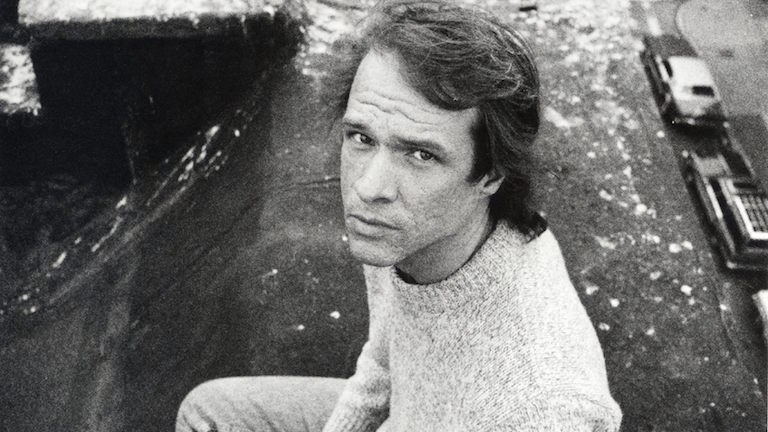Buddhist Bubblegum Music: Arthur Russell’s secret pop genius
December 3rd 2015
FBi Radio

An introduction to a legend, by In The Pines’ Johanna Roberts.
Among the excellent folk offerings in Sydney Festival’s 2016 program is something with more cinematic leanings – although the composer’s musical history also contains both charming low-key country shuffle and avant-garde disco.
You want bare-bones guitar and a sweet voice? Try anything from Love Is Overtaking Me. Jittery no-wave, spacious early electronica, experimental hip hop more your thing? Slightly off-kilter proto-house anthems? He’s got that too.
Arthur Russell is a formidable ghost in the fabric of New York’s legendary downtown art scene, a dedicated genre-bender whose prolific creative output has only gradually been brought to light in the 23 years since his death. His collaborators included Allen Ginsberg, minimalist pioneers Phillip Glass and Steve Reich, David Byrne and Bootsy Collins. He effortlessly passed through multiple musical boundaries, sharing little between them other than an innate feeling for sonic texture and embedded melody. He’s a difficult man to contain. So where do you start?
Ballad of the Lights
Richard Hell (more on him later) and Tom Verlaine changed their names and escaped to New York, Patti Smith crossed the river from New Jersey. Arthur Russell took his cello and left the cornfields of Oskaloosa for San Francisco, where he joined a Buddhist commune and met Allen Ginsberg. He studied North Indian classical music and western composition and played behind Ginsberg’s performances, and then he fetched up in New York too.
It’s kind of disingenuous to attempt to break down Russell’s output chronologically, as his explorations were never so clearly categorised. The collaborative Ballad of the Lights was recorded in 1977, long after their west coast days, but it’s a beautiful entry point to their inspired combination of cult poet and composer.
Close My Eyes
In Manhattan, Russell continued to work with Ginsberg, moving into his East Village apartment building alongside neighbour Richard Hell – who may be the most influential musician ever to have left two seminal bands before they recorded their debut albums, and whose perfect fingerprints are all over the ‘70s NYC punk scene. Meanwhile he was also performing gentle soul-tinged folk with a little Lou Reed by-way-of Jonathan Richman in there too. After seeing The Modern Lovers he’d befriended bassist Ernie Brooks, eventually forming dreamy country pop band The Flying Hearts. The Audika Records compilation Love Is Overtaking Me features them alongside solo Russell and other likeminded projects he had going from the early ‘70s up to 1991.
Autumn 1973 saw him taking over as musical director for multidisciplinary performance space The Kitchen, where he booked both Talking Heads and The Modern Lovers. It was controversial move amongst the experimental set, but goes a long way in illustrating Russell’s ever-expanding interests and influences. Still in operation, The Kitchen has eased up some; even featuring some very young Beastie Boys performing in late 1983.
Instrumentals A
More or less simultaneously, Russell was immersing himself in orchestral compositions, piecing together an opus planned as a 48 hour performance but only ever played live in fragments. ‘Instrumentals’ is quite different from anything else he produced (although that’s probably true of most of his work) – more concert hall in scope but still carrying a torch for avant-garde pop. It’s also maybe the most accessible of experimental music of that era; inviting, playful and only just flirting with minimalism. Russell folded Aaron Copland-esque sounds of the American West into contemporary cityscapes, his current musical geography melting into frontier dreams.
It’s this facet that will be showcased at Sydney Festival, a revival of the 1975 performance of ‘Instrumentals’ with original musicians Peter Gordon and Ernie Brooks at its heart.
Is It All Over My Face?
And then there was disco.
If you went to any of the predominantly queer clubs in New York in the ‘70s, chances are you ended up dancing to one of Russell’s alter egos. If you went to any of the more independent clubs in Sydney in the early ’00s you would have done the same. His much-sampled, slyly sexual ‘Is It All Over My Face’ is a bona-fide dancefloor classic and an enduring influence; and it’s in this field that Russell achieved his most immediate success. He recorded a number of 12” singles under various names, which account for most of the recorded output that actually made it to the public in his lifetime. Soul Jazz Records put together The World of Arthur Russell in 2004, a collection of these now-cult cuts.
Not for nothing, FBi even has an excellent, eclectic show named for his pivotal Loose Joints collaboration…
Wild Combination
If you need more, Matt Wolf’s gorgeous and elliptical documentary Wild Combination offers a perfect nudge on down the Arthur Russell rabbit hole. (Also highly recommended: Wolf’s meditative take on the history of youth culture in Teenage). Featuring stories from friends, colleagues, his parents and an archival Allen Ginsberg, the photographs and old footage is held together with amorphous visuals that take their cues from Russell’s compositions. It’s a fitting tribute to an unassuming luminary.
It’s also possibly the only contemporary music documentary that doesn’t feature Bono, which may be recommendation enough.
Arthur Russell’s music touches on everything.
It’s joyous and thoughtful and intricate and straight-up beautiful, no matter what genre he was busy upending. He continued to write and record up until his untimely death at 40 in 1992, and his uncontained enthusiasms and endless invention still keep him outside of time.
WHAT: Arthur Russell’s Instrumentals directed by Peter Gordon
WHERE: City Recital Hall, 2-12 Angel Place, Sydney
WHEN: 16 January, 2016
HOW MUCH: $35 – $65 + BF from Sydney Festival


